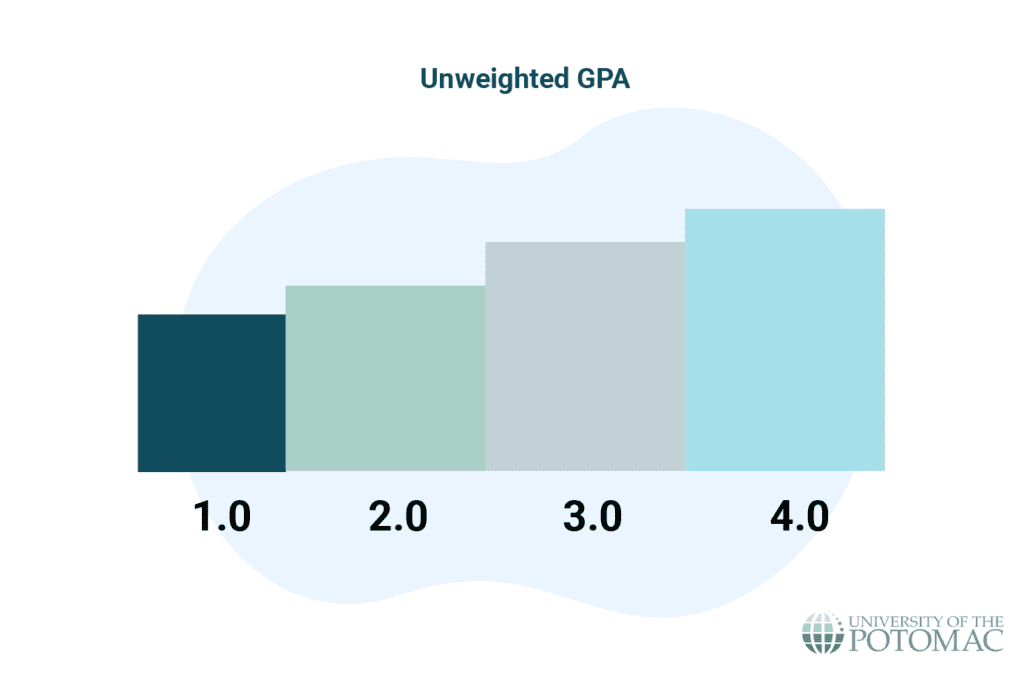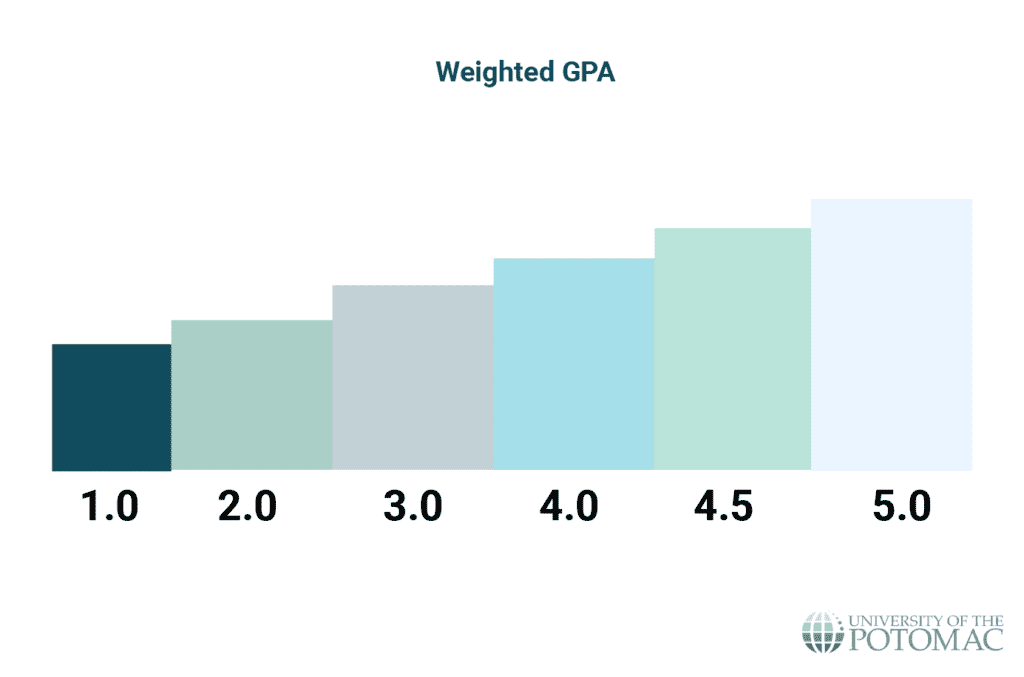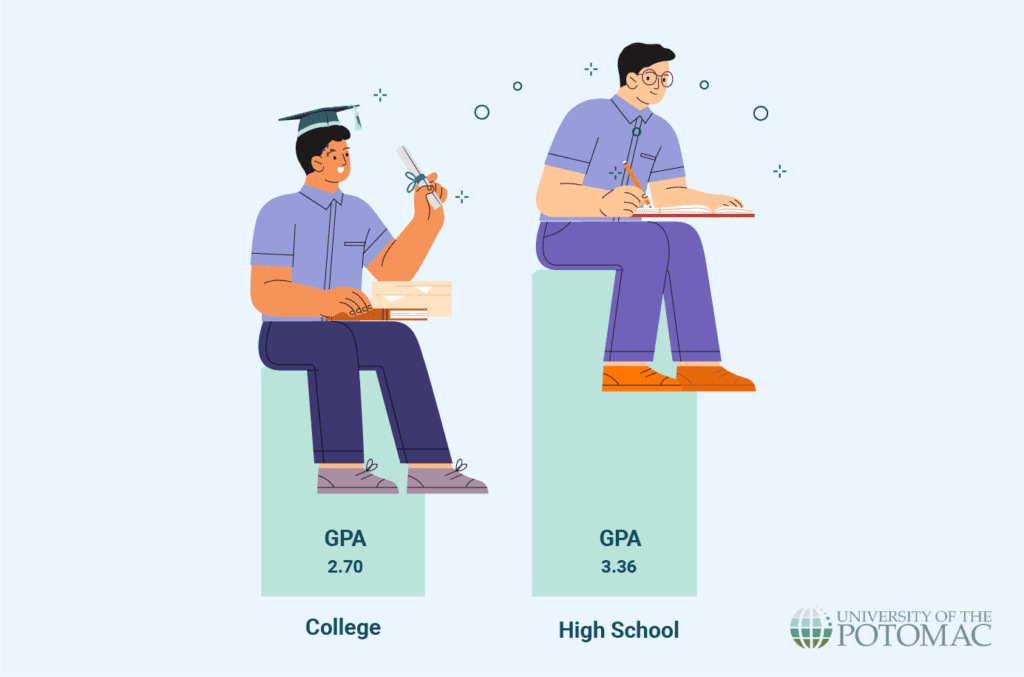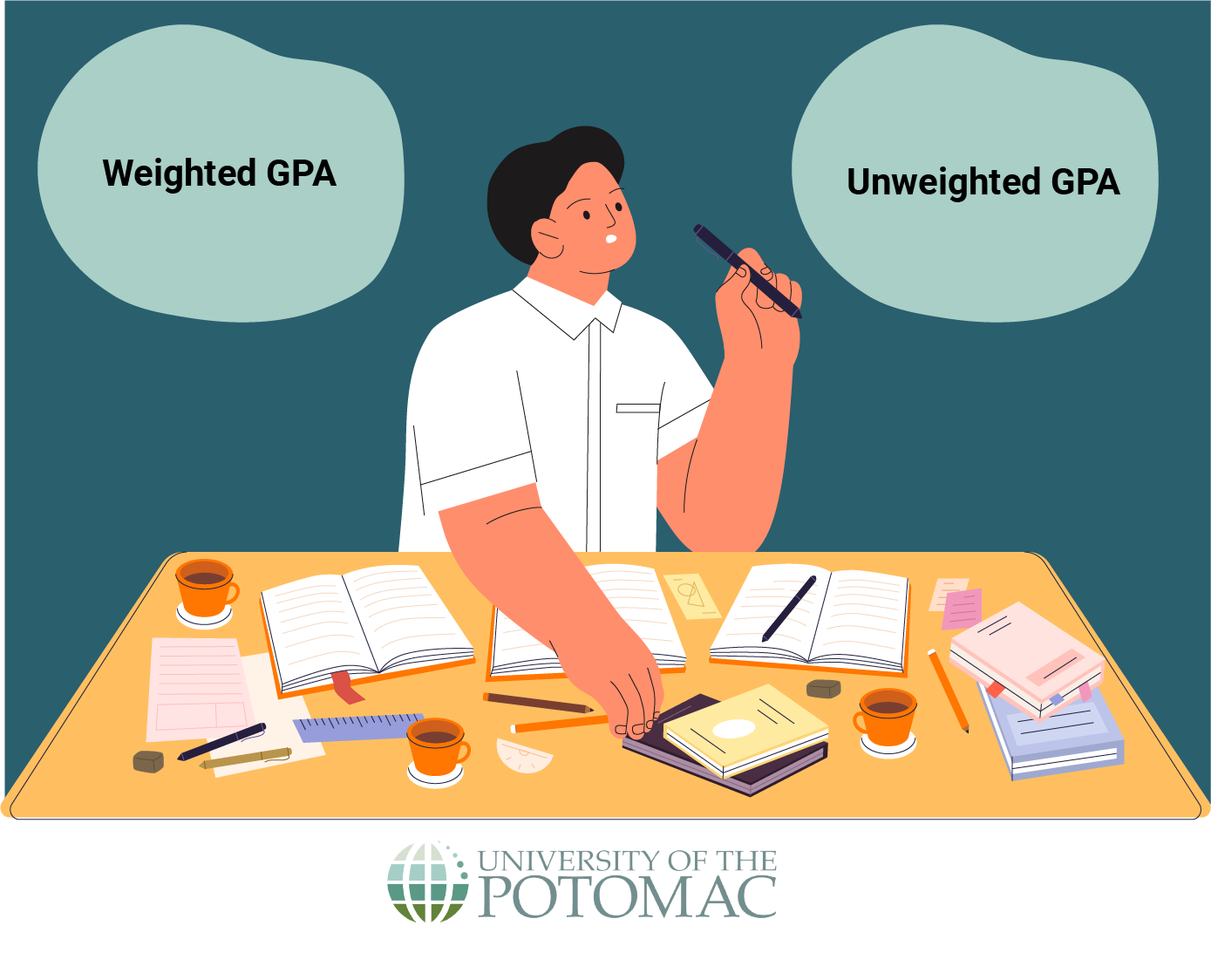In a world that often measures potential through a numerical lens, pursuing a high GPA emerges as a focal point that usually occupies students’ minds. The pressure of achieving a high GPA intensifies as students strive to excel and stand out in an increasingly competitive landscape, especially when intertwined with college admissions and scholarships.
So, what’s a good college GPA? Well, it all depends on the type of GPA you are graded with. So, read on and learn more about weighted vs. unweighted GPAs and navigate the educational landscape effectively.
Understanding GPA
GPA, which stands for Grade Point Average, is a tool used by academic institutions, primarily within the United States, to comprehensively evaluate students’ academic accomplishments. This assessment approach involves converting traditional assignment grades or percentage scores into equivalent points on a standardized scale. This numerical representation aids in quantifying the degree of success attained by a student.
Explanation of GPA Calculation
Generally, in most systems, the typical letter grades assigned to students correspond to a numerical value. For example, an A is equal to 4, a B is equal to 3, a C to 2, and so on. For GPA calculations, these numerical values are multiplied by the course credit hours in order to determine the grade points earned for each class. Then, the sum of these points across all courses is divided by the total number of course credit hours, yielding the overall GPA. This calculation method allows for a holistic evaluation of a student’s academic progress, accommodating different course loads and grading scales.
Importance of GPA in College Admissions and Scholarships
A strong GPA is like a badge showcasing a student’s commitment to their education. It highlights the fact that they’ve put in a lot of effort and hard work to excel in their studies. This is why colleges and universities often look at GPAs when they select new students to enroll. It helps them understand how well a student is likely to perform academically.
But a high GPA isn’t just about impressing colleges; it also provides opportunities for financial help. Many scholarship programs use GPA as a deciding factor when determining eligibility.
Unweighted GPA

An unweighted GPA is a straightforward method to measure a student’s academic performance without considering the difficulty level of the courses taken.
Calculation Method for Unweighted GPA
Calculating the unweighted GPA involves converting the letter grades received in each class, whether a regular or honors course, into their equivalent numerical values, adding them all up, and then dividing them by the total number of classes.
Pros and Cons of Unweighted GPA
A significant pro of using unweighted GPAs is that they are simple and easy to understand, providing a general overview of academic achievement for all students in the same manner without complicating matters with course differentiation or difficulty levels. However, its downside is that because it doesn’t account for the rigor of advanced courses, it undervalues students who challenge themselves with more demanding subjects.
Weighted GPA

As its name implies, weighted GPAs assign extra “weight” to specific courses based on their difficulty level. For example, honors classes, Advanced Placement (AP), International Baccalaureate (IB), or other typically more challenging classes have more influence on the overall GPA than standard courses.
Calculation Method for Weighted GPA
Calculating the weighted GPA is similar to that of an unweighted GPA, except it involves considering the difficulty of classes and giving extra value to grades in advanced courses. After converting the letter grades to their corresponding weighted points, the points are multiplied by the class’s credit hours to get weighted grade points. Adding these points for all classes and dividing them by the total credit hours provides the weighted GPA.
Factors Affecting Weighted GPA
Several things can affect a weighted GPA. Firstly, it is crucial to determine how difficult the schools deem each class to be and the amount of extra points awarded. Furthermore, the school’s regulations regarding the maximum number of advanced courses a student can enroll in within an academic year play a role in the final GPA, as they can significantly boost the overall GPA and pass the typical 4.0 scale. Lastly, different colleges and universities might have unique ways of evaluating weighted GPAs, thus determining whether the GPA increases or decreases once you apply for enrollment.
Weighted vs. Unweighted: Key Differences

Unweighted GPAs provide a primary measure of grade averages, while weighted GPAs incorporate additional factors when evaluating students’ academic abilities and efforts. Therefore, they differ in two key categories: measurement scale and calculation.
Measurement Scale
When discussing weighted vs. unweighted GPA, a fundamental contrast lies in the measurement scales used for each. The unweighted GPA utilizes a standard 4.0 scale. This means that grades like A, B, C, and so on directly correspond to the numerical values 4, 3, 2, and so forth. In contrast, weighted GPAs introduce a slight variation by assigning higher values to some advanced classes. Therefore, the scale extends beyond the standard 4.0 value. For example, an A in an AP class might translate to 4.5 or 5.0 points, thus providing opportunities for a higher GPA.
Calculation
The calculation methods between weighted and unweighted GPAs also slightly diverge. An unweighted GPA is calculated by averaging the numerical equivalents of letter grades across all classes, treating each course on an equal base. On the other hand, a weighted GPA factors in the difficulty of classes by assigning weights to grades in advanced courses, leading to a GPA that reflects the extent of academic challenge.
Interested in pursuing a degree?
Fill out the form and get all admission information you need regarding your chosen program.
This will only take a moment.
Message Received!
Thank you for reaching out to us. We will review your message and get right back to you within 24 hours.
If there is an urgent matter and you need to speak to someone immediately you can call at the following phone number:
- We value your privacy.
College Admissions Perspective
When considering admission, higher education institutions use weighted and unweighted GPAs to understand their applicants’ academic abilities, achievements, and educational commitment. However, there is a slight difference in the way they use the two types of GPAs.
How Colleges Use Weighted and Unweighted GPAs
Colleges value weighted GPAs because they provide insights into students’ willingness to challenge themselves academically. When a student has a strong weighted GPA, it can positively impact their chances of admission, particularly if the college emphasizes rigorous coursework and values students who go beyond the standard curriculum. On the other hand, unweighted GPAs are primarily used to compare applicants from different schools with varying grading systems by putting them all in one standard measurement tool.
GPA Calculation Tools and Resources for Students
Calculating your GPA is essential for tracking your academic progress and navigating grading intricacies. Even if you still have issues differentiating between weighted and unweighted GPAs, numerous online tools and resources are available to streamline the process. Below, we present a selection of recommended tools and resources:
- Online GPA Calculators: They allow you to input your course grades and credit hours to calculate both weighted and unweighted GPAs.
- Academic Task Management Apps: Such apps are designed to help students manage their academic schedules, assignments, exams, and grades. Typically, they also feature GPA calculators.
- School Websites and Portals: Most educational institutions offer GPA calculators on their websites or portals that are customized for their grading system, resulting in more precise results.
- Educational Blogs and Videos: Numerous academic blogs and YouTube channels offer guides and tutorials on calculating GPA, understanding grading scales, and interpreting the significance of different grades.
- Academic Advisors and Guidance Counselors: Reach out to your academic advisor or counselor for help calculating your GPA. They can provide personalized advice and help navigate any intricacies.
- Conversion Charts: These charts are beneficial if you’re applying to international institutions or need to convert your GPA to a different scale.
Conclusion
The distinction between weighted and unweighted GPAs primarily lies in the fact that the former gives more weight to advanced classes based on their difficulty, while the latter treats all classes equally. From a college admissions perspective, being aware of both types of GPAs enables applicants to present a well-rounded view of their academic achievements and capabilities, catering to institutions that value rigorous coursework or a standardized measure. Ultimately, the knowledge of these GPA types equips students to not only tackle the educational challenge but also embrace the opportunities it opens up for college admissions and beyond.
Frequently Asked Questions (FAQ):
What is the difference between weighted and unweighted GPA?
Weighted GPAs consider the difficulty of courses and assign higher values to advanced classes, whereas unweighted GPAs treat all classes equally.
How is an unweighted GPA calculated?
Unweighted GPA is calculated by converting letter grades to numerical values, adding them up, and dividing the sum by the total number of classes.
What courses are considered for weighted GPA?
AP, honors, IB, and other challenging courses are typically considered for weighted GPA.
Why do schools use weighted GPAs?
Schools typically use weighted GPAs to recognize and reward students for taking challenging courses, promoting academic rigor.
Do colleges prefer weighted or unweighted GPAs?
It varies. Some colleges prioritize weighted GPAs to assess academic challenges, while others lean towards unweighted GPAs for a more standardized evaluation approach.
Does a higher GPA guarantee college acceptance?
Technically, no. A higher GPA is beneficial but is not the only factor that college admissions consider when evaluating applicants.
Do all schools use the same GPA calculation method?
No, GPA calculation methods can vary between schools.










